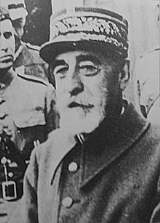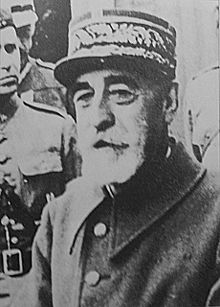
French Military Mission to Poland
Encyclopedia

France
The French Republic , The French Republic , The French Republic , (commonly known as France , is a unitary semi-presidential republic in Western Europe with several overseas territories and islands located on other continents and in the Indian, Pacific, and Atlantic oceans. Metropolitan France...
to aid the nascent Second Polish Republic
Second Polish Republic
The Second Polish Republic, Second Commonwealth of Poland or interwar Poland refers to Poland between the two world wars; a period in Polish history in which Poland was restored as an independent state. Officially known as the Republic of Poland or the Commonwealth of Poland , the Polish state was...
after it achieved its independence in November, 1918, at the end of the First World War. The aim was to provide aid during the Polish-Soviet War
Polish-Soviet War
The Polish–Soviet War was an armed conflict between Soviet Russia and Soviet Ukraine and the Second Polish Republic and the Ukrainian People's Republic—four states in post–World War I Europe...
(1919–1921), and to create a strong Polish military to serve as a useful ally against Germany. It was an advisory body consisting of about 400 French officers attached to staffs of Polish units at various levels. Although the French mission was small numerically, its effect was substantial in improving the organisation and logistics
Logistics
Logistics is the management of the flow of goods between the point of origin and the point of destination in order to meet the requirements of customers or corporations. Logistics involves the integration of information, transportation, inventory, warehousing, material handling, and packaging, and...
of the Polish army. It worked in parallel with the smaller British Military Mission to Poland
British Military Mission to Poland
The British Military Mission to Poland was an effort by Britain to aid the nascent Second Polish Republic after it achieved its independence in November, 1918, at the end of the First World War....
. It existed from 1918 to 1939.
Its first commander was French General Paul Prosper Henrys
Paul Prosper Henrys
Paul Prosper Henrys was a French general.Commanded the French army on the Balkan front in the final year of the First World War...
, previously the commander of French forces in the Balkans
Balkans
The Balkans is a geopolitical and cultural region of southeastern Europe...
. The French mission, composed of 400 officer-instructors, met with much respect. The instructors, many of them centered around the Polish General Staff, were crucial in training the emerging Polish officer corps. The French effort was vital in improving the organisation of the newly formed Polish army, which up till 1919 used various manuals, organisation structures and equipment, mostly from the former partitioners
Partitions of Poland
The Partitions of Poland or Partitions of the Polish–Lithuanian Commonwealth took place in the second half of the 18th century and ended the existence of the Polish–Lithuanian Commonwealth, resulting in the elimination of sovereign Poland for 123 years...
armies. Among the French officers was the future President of France, Charles de Gaulle
Charles de Gaulle
Charles André Joseph Marie de Gaulle was a French general and statesman who led the Free French Forces during World War II. He later founded the French Fifth Republic in 1958 and served as its first President from 1959 to 1969....
.
This mission should not be confused with the Interallied Mission to Poland
Interallied Mission to Poland
Interallied Mission to Poland was a diplomatic mission launched by David Lloyd George on July 21, 1920, at the height of the Polish-Soviet War, weeks before the decisive Battle of Warsaw...
, an improvised effort launched by David Lloyd George
David Lloyd George
David Lloyd George, 1st Earl Lloyd-George of Dwyfor OM, PC was a British Liberal politician and statesman...
on July 21, 1920, at the height of the crisis before the Battle of Warsaw
Battle of Warsaw (1920)
The Battle of Warsaw sometimes referred to as the Miracle at the Vistula, was the decisive battle of the Polish–Soviet War. That war began soon after the end of World War I in 1918 and lasted until the Treaty of Riga resulted in the end of the hostilities between Poland and Russia in 1921.The...
. The purpose of that mission was to send a number of high level personages from Britain and France to Poland in an attempt to influence Polish policy, possibly through effecting a change in government. They included French diplomat, Jean Jules Jusserand
Jean Jules Jusserand
Jean Adrien Antoine Jules Jusserand was a French author and diplomat. He was the French ambassador to the United States during World War I.-Career:...
, Maxime Weygand
Maxime Weygand
Maxime Weygand was a French military commander in World War I and World War II.Weygand initially fought against the Germans during the invasion of France in 1940, but then surrendered to and collaborated with the Germans as part of the Vichy France regime.-Early years:Weygand was born in Brussels...
, chief of staff to Marshal Ferdinand Foch
Ferdinand Foch
Ferdinand Foch , GCB, OM, DSO was a French soldier, war hero, military theorist, and writer credited with possessing "the most original and subtle mind in the French army" in the early 20th century. He served as general in the French army during World War I and was made Marshal of France in its...
(the Supreme Commander of the victorious Entente
Triple Entente
The Triple Entente was the name given to the alliance among Britain, France and Russia after the signing of the Anglo-Russian Entente in 1907....
), and the British diplomat, Lord Edgar Vincent D'Abernon. The crucial Battle of Warsaw was won in the early days of August, before the mission could achieve anything of importance. The only tangible result was the installation of Weygand as an advisor to the Polish General Staff, where his role was negligible. Nevertheless, soon after the battle and for various political reasons, a myth arose that Weygand was the author of the Polish victory at Warsaw.

